Interiors of Belur Chennakeshava temple:
Originally the interior received much daylight, but the added screens make it dark and mysterious.
The interior of the temple consisting of a garbhagriha, Sukhanasi, navaranga and a mandapa takes us to a new world of sculptures with lathe turned pillars of various designs.
The central square of the navaranga has four pillars decorated with bracket figures atop. These bracket figures are remarkably of superior workmanship in conception and execution.
The Navaranga has raised verandah's on both sides of the three entrances.
Sufficient space has been left out in the central hall (Navaranga) for musical performances and Puja (worship) ceremonies by large numbers of devotees and others.
 |
| Sculptures on the entrance of Garbhagriha |
Pillars:
There are a total of 48 pillars, while the four central pillars have been hand churned, the others had been lathe turned.
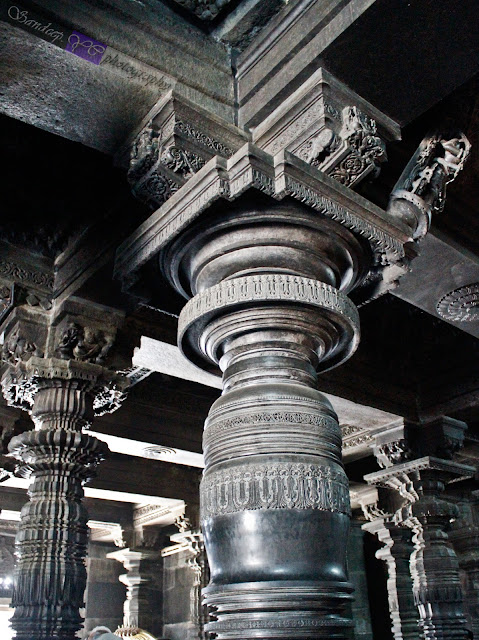 |
| One of the four Pillar's at the central square of the Navaranga |
 |
| Some of the other pillars beautifully designed, the second pillar here is the central pillar of the Navaranga. |
All the pillars are artistically executed and are different from one another in design and the arrangement enhances the beauty of the Navaranga.
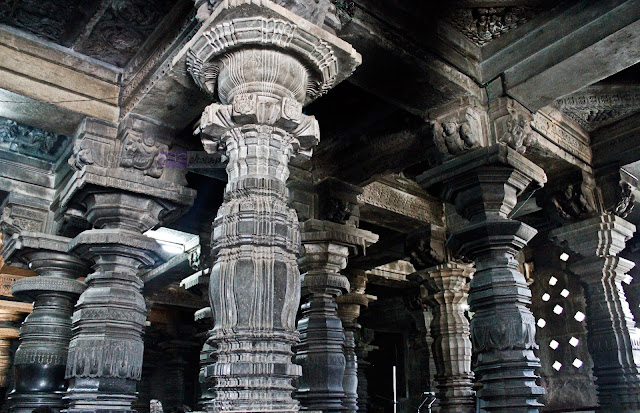 |
| Pillars inside the Main hall, each one is unique in design |
The well-known Narsimha pillars are carved out with minute figures all round from the top to the bottom. A tiny bull (Kadali-basava) is in the size of a seed of the Bengal gram (Kadal). A small space on the south face of the pillar is said to have been left blank by the artist who prepared the pillar as a challenge to any artist who can appropriately fill it up. It is said could be turned on its axis.
 |
| Here you can see the scale of Narasimha Pillar, infront of people. |
 |
| The Narasimha Pillar |
 |
| Design on the Narasimha pillar |
The
Mohini pillar in the navaranga is one of the finest specimens. The pillar is cut vertically on a sixteen pointed star plan. It is decorated with a narrow band of filigree work. A creeper scroll and figures inset in convolutions. It has eight vertical bands with fine scroll work the convolutions of which are made up of delicately executed figures representing the Hindu minor gods of the eight directions and others. The eastern face of the pillar has a large beautifully carved image of Vishnu as Mohini exceedingly graceful with a chauri bearer and garuda on the other.
 |
| Mohini sculpture at the Mohini Pillar |
 |
| You can see here that these pillars are made hollow from inside out of a single stone, carved so delicately. Mohini Pillar |
 |
| Mohini Pillar |
 |
| Rows of Pillars, beautifully carved |
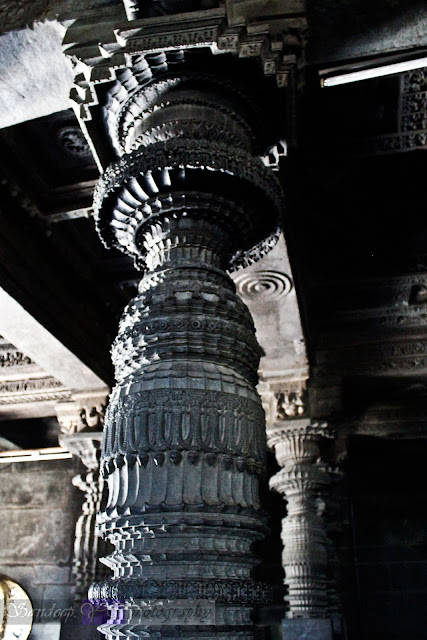 |
| This one had some magnificent patterns on its surface. |
 |
| Row of pillars from the Narasimha pillar towards the main entrance on the east |
 |
| Other set of pillars towards the north entrance of the Navaranga |
Ceilings:
There are many delicately carved
ceilings and they represent the best specimens of that type.
 |
| Stone sculptures on the roof |
The central vimana: The four central pillars support a large domed ceiling of about 3.05 meters (ten feet) in diameter, 1.83 meters (six feet) deep, that is one of the most elaborately decorated ceilings in all India.
 |
| The amazingly beautiful central vimana, or the central dome of the Chennakeshava temple, Belur |
It is elegantly carved with frieze of varied sculptures some being mythological.
 |
| Friezes of various sculptures on the bottom of the central dome |
Narasimha stands at the central of the ceiling protruding out of the dome. It is a remarkable piece of artistic workmanship famous for the richness of ornamentation and elaboration of details.
 |
| The epicenter of the central dome with Narasimha protruding out of the Dome |
Brahma, Vishnu and Mahesvara are shown on a lotus bud and the bottom frieze of Madanikas, standing on the capitals of the four central pillars, add much to the grace and charm of the Navaranga. Three of them are signed by the sculptors.
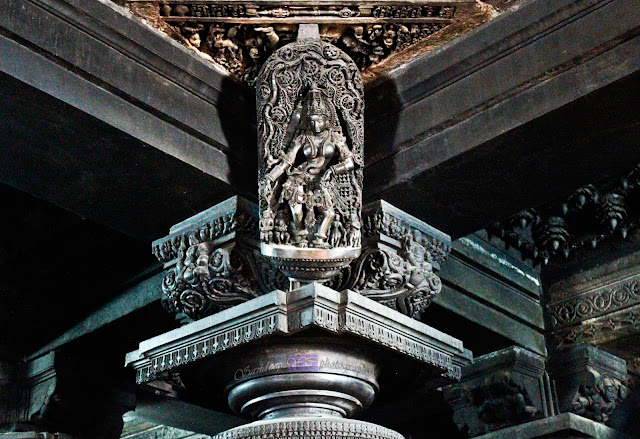 |
| Sculptures of Madanika's on the central four pillars, in the pic is Gandharva Shilabalike |
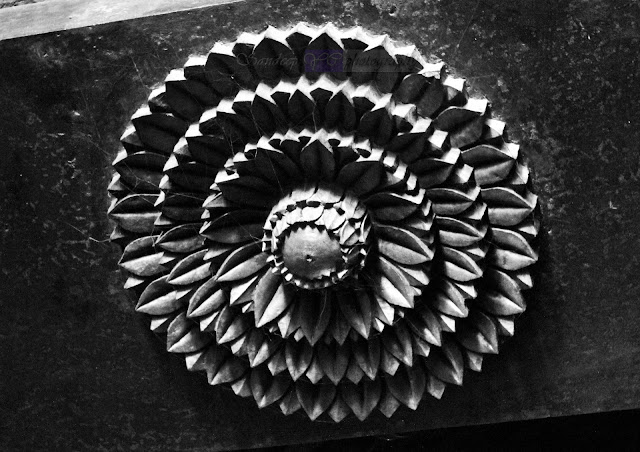 |
| A common design found on the roofs |
 |
| Ornate bay ceiling in mantapa |
 |
| Ornate bay ceiling in mantapa |
Garbhagriha:
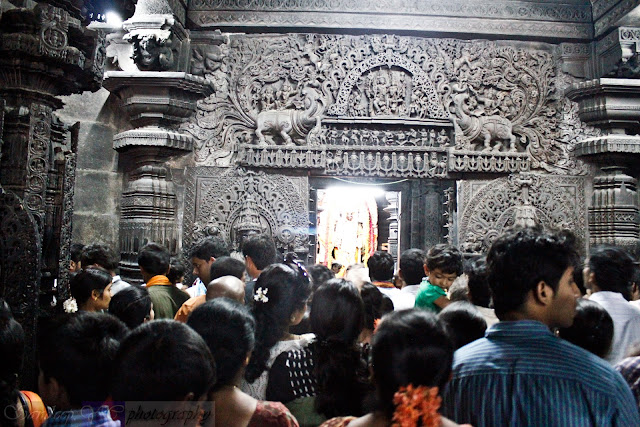 |
| The crowd during the pooja timings at the temple |
The doorway of the garbhagriha is another specimen of delicate carvings unsurpassed of that type. Inside the garbhagriha is the sculpture of Keshava (Vijaya-Narayana), a handsome figure of 1.83 metres (six feet) in height with a halo (Prabha), standing on a 0.91 metre (three feet) high pedestal, holding sankha, chakra, gada and Padma in his hands, with a karanda makuta(crown) at his head. Bhudevi and sridevi are standing at the bottom.
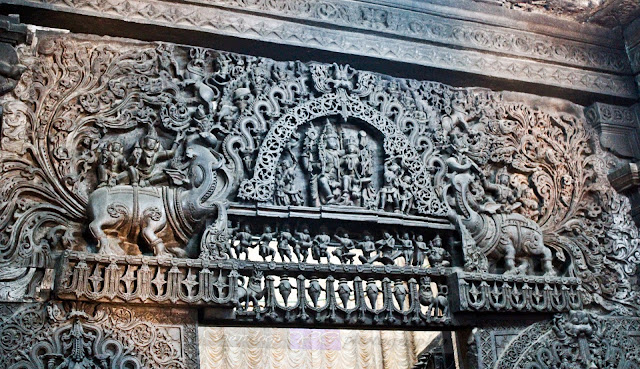 |
| The intricately carved doorjamb of the Garbhagriha |
 |
| Intricately carved Makara toranas on the exterior of the Garbhagriha |
 |
| The doorway, you can see here the hollow structure around these sculptures which opens up to the Garbhagriha |
The door jambs: The door jambs of the sukhanasa and garbhagriha carry across intricately carved
Makara toranas on the exterior.
The door-keepers (Dvarapalas) are elegantly executed on the Sukhanasi (vestibule) doorway. Its pediment with a fine figure of Lakshmi-Narayana in the centre has excellent filigree work. The Makaras at the side bear Varuna and his consort on the back.
 |
| The amazing view from the side of the garbhagriha doorway, here you can see the whole structure is so beautifully carved not leaving behind any piece of stone plain. |
After spending decent time at the temple we went for a small shopping around the temple complex where you find some beautiful stone and metal sculptures made from the local people, most popular being the Mahavira face carved from granite stones. The sun was heating us while we were feeling hungry; it was about 2 pm when we left Belur towards Halebeedu town. The road towards Belur from Hassan was not so good, but manageable.
Halebeedu Hoysaleshwara Temple …To be continued…



































amazing
ReplyDelete